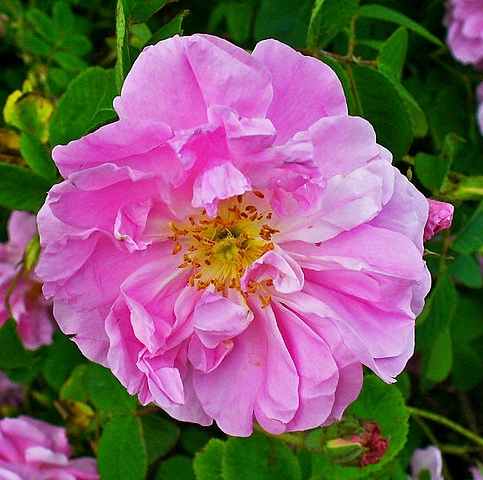Rosa × damascena, more commonly known as the Damask rose, or sometimes as Bulgarian rose, Turkish rose, Taif rose, Arab rose, Ispahan rose and Castile rose, is a rose hybrid, derived from Rosa gallica and Rosa moschata. DNA analysis has shown that a third species, Rosa fedtschenkoana, has made some genetic contributions to the Damask rose.
The flowers are renowned for their fine fragrance, and are commercially harvested for rose oil (either “rose otto” or “rose absolute”) used in perfumery and to make rose water and “rose concrete”. The flower petals are also edible. They may be used to flavor food, as a garnish, as an herbal tea, and preserved in sugar as gulkand.
Most historians assume that the cultivation of the “Bulgarian rose”, as Rosa × damascena is denominated in that region. It is reported that roses have been cultivated in the area since Roman times. It is cultivated for commercial use in an area in the vicinity of Kazanlak and Karlovo called the “Valley of Roses”. The distillate from these roses is called “Bulgarian Rose Oil” and “Bulgarian Rose Otto”.
Turkish rose oil is sold as “Rose Oil”, “Turkish Rose Otto”, and “Rosa Damascena Attar”, or “Ittar” in similar languages. While families still operate their own small distilleries and produce what is denominated “village oil”, the commercialization of rose oil as a high quality product is carefully regulated by a state cooperative in the Isparta region of Turkey. The roses are still grown by the small family farms but the flowers are brought to stills established and regulated by the cooperative for distillation and quality control.
Wikipedia

